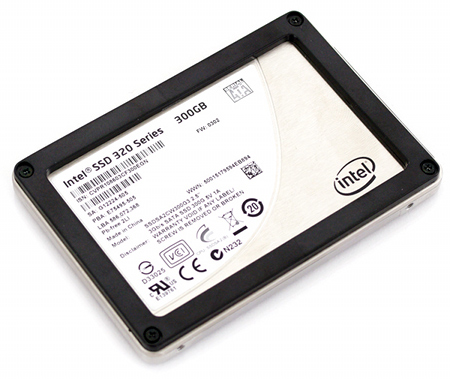Intel offers 25nm-fabbed SSDs with up to 600GB
Mar 28, 2011 — by LinuxDevices Staff — from the LinuxDevices Archive — viewsMechanical hard disk drives took another step toward obsolescence via Intel's announcement of its “third-generation” solid state disks (SSDs). Now offered in capacities as high as 300 or 600GB, the SSD320 series offers lower pricing, sequential write speeds that have doubled in speed, plus new encryption and data protection features, the company says.
Intel's first SSD, the X25-M, made its debut in 2008 using MLC (multi-level cell) flash technology manufactured using a 50nm process. Priced at nearly $600 for 80GB of storage, the 2.5-inch, SATA-interfaced drive became cheaper and faster last year when Intel moved to 34nm manufacturing. (At that point, the 80GB SSD device gained a list price of $270, plus sustained read/write ratings of 250MB/sec. and 70MB/sec., respectively.)
Meanwhile, Intel also offered an SSD manufactured using SLC (single-level cell) flash technology, the X25-E. This initially offered better write speeds than MLC-based products, and the chip giant has touted it since 2008 as offering higher reliability in enterprise servers than the consumer-focused X25-M.
Now, the 25nm-fabbed SSD 320 Series, which "replaces and builds on the X25-M," is being promoted as suitable for notebooks, desktops, and data centers alike. According to Intel, reliability has been improved two different ways:
- an array of surplus NAND flash is provided on the drive, so that if and when the controller encounters a faulty NAND array, it can reconfigure itself to reduce the prospect of data loss
- small onboard capacitors provide enough reserve power for the drive to complete any data writes that were in progress, even if power fails
It's further said the SSD 320 drives, which include Intel-designed controllers, include 128-bit AES encryption. In addition, an SSD Optimizer utility gives Windows users "a powerful set of management, information and diagnostic tools to help maintain the health and out-of-box performance of the drive," according to Intel.

The 320GB version of Intel's new SSD 320
(Click to enlarge)
For the first time, the SSD 320 devices — all SATA II-interfaced — are being offered in hard disk-rivaling 300GB and 600GB sizes, says Intel. Previously offered 40GB, 80GB, 120GB, and 160GB versions continue to be available, the company adds.
Read and write speeds vary, as this [PDF-formatted] data sheet shows. For all but the entry-level drive, however, 270MB/sec. reads are cited. The top 600GB offering is claimed to write data almost as fast (200MB/sec.), while the 156GB drive that will likely be more mainstream has a 165MB/sec. write speed.
According to Intel, 80GB, 160GB, and even 300GB models will be squeezed into a 1.8-inch form factor, while 2.5-inch versions offer all the capacities mentioned in this story. The drives feature a 1.2-million-hour MTBF, power consumption of 150mW while active (and 100mW when idle), and may be used from 32 to 158 deg. F.
Pete Hazen, director of marketing for the Intel Non-Volatile Memory (NVM) Solutions Group, stated, "Intel's third generation of SSDs adds enhanced data security features, power-loss management and innovative data redundancy features to once again advance SSD technology. Whether it's a consumer or corporate IT looking to upgrade from a hard disk drive, or an enterprise seeking to deploy SSDs in their data centers, the new Intel SSD 320 Series will continue to build on our reputation of high quality and dependability over the life of the SSD."
Pricing and availability
Intel's announcement was not specific about availability but implied the SSD 320 Series will go on sale shortly at a variety of retailers. Prices, based on 1,000-quantities, were said to be as follows: 40GB at $89; 80GB at $159; 120GB at $209; 160GB at $289; 300GB at $529 and 600GB at $1,069.
Initial reviews of the devices may be found at AnandTech, Legit Reviews, PC Perspective, and StorageReview.com.
Jonathan Angel can be followed at www.twitter.com/gadgetsense.
This article was originally published on LinuxDevices.com and has been donated to the open source community by QuinStreet Inc. Please visit LinuxToday.com for up-to-date news and articles about Linux and open source.